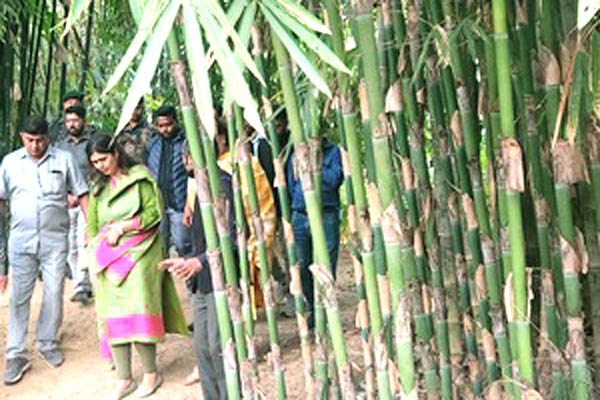
Maharashtra Likely to Ink MoU with Tripura to Boost Bamboo Industry and Entrepreneurship: Minister Pankaja Munde
Agartala, Feb 19, 2025, By Our Correspondent48
In a significant move to strengthen the bamboo industry and foster bamboo-based entrepreneurship, the Maharashtra government is likely to sign a Memorandum of Understanding (MoU) with Tripura, visiting Maharashtra Environment and Climate Change Minister Pankaja Munde announced on Tuesday.
During her two-day official visit to Tripura, Minister Munde explored the Bamboo and Cane Development Institute (BCDI) and other key locations to gain insights into Tripura’s thriving bamboo industry. She was introduced to various bamboo species, cultivation techniques, and industrial applications, highlighting the potential for collaboration between the two states.
Tripura’s Expertise in Bamboo Industry: A Model for Maharashtra
Speaking to the media after her visit, Munde emphasized the immense economic and environmental benefits of bamboo cultivation and utilization. She noted that Maharashtra is keen to replicate Tripura’s success in bamboo-based industries and integrate the knowledge gained to implement a Bamboo Mission in Maharashtra.
"Bamboo is a versatile and sustainable resource that can be widely used in industrial applications, including construction, furniture-making, and even jewelry production. Given its fast-growing nature and eco-friendly attributes, it can also serve as a substitute for firewood, helping to reduce deforestation and combat climate change," Munde stated.
She further highlighted that with some modifications and value-added innovations, bamboo can be a key driver of employment generation in rural Maharashtra, providing livelihood opportunities for artisans and small-scale entrepreneurs.
Tripura: A Hub for Bamboo Innovation and Industrial Growth
Tripura is one of India’s leading states in bamboo cultivation and innovation, with at least 19 commonly found species of bamboo thriving in its tropical moist deciduous forests. The state’s bamboo-bearing forest area spans 3,246 square kilometers, making it a vital resource for sustainable industry.
Tripura, along with its northeastern counterparts like Mizoram, Arunachal Pradesh, and Assam, collectively accounts for 28% of India’s total bamboo forest cover. This abundance has led to the development of India’s first dedicated Bamboo Park at Bodhjungnagar Industrial Growth Centre, a 135-acre, Rs 30 crore project launched in 2009 to boost bamboo-based industries.
Bamboo Park: A Game-Changer for Industrial Growth
The Tripura Industrial Development Corporation (TIDC) has been instrumental in promoting bamboo-based entrepreneurship, providing state-of-the-art infrastructure and incentives for new businesses. The Bamboo Park has already attracted several entrepreneurs and large-scale industries, including a major factory specializing in bamboo flooring tiles (Bamboowood), laminated bamboo boards, furniture, partition walls, and home décor materials.
According to TIDC officials, thousands of eco-friendly bamboo products are traditionally crafted in Tripura and other northeastern states, ranging from daily-use household items to premium handcrafted artifacts.
The Bamboo Park offers comprehensive industrial facilities, including:
✅ Bamboo raw material depot
✅ Bamboo splitting and slivering unit
✅ Bamboo treatment and processing center
✅ Drying chambers and testing labs
✅ Logistics hub and warehousing
✅ Machine maintenance centers
These cutting-edge amenities ensure quality enhancement, streamlined production, and market expansion for bamboo-based enterprises.
Bamboo: A Sustainable Solution for a Greener Future
With the increasing focus on sustainable development and environmental conservation, bamboo is emerging as a key alternative to traditional construction materials, reducing reliance on timber and mitigating deforestation.
Munde stressed that Maharashtra, with its diverse climatic zones and growing eco-conscious policies, can benefit immensely from integrating bamboo into its industrial framework. She indicated that the proposed MoU with Tripura would facilitate knowledge exchange, technological transfer, and business collaborations between stakeholders in both states.
"By leveraging Tripura’s expertise, we can empower rural communities, boost green entrepreneurship, and make bamboo a viable industrial material in Maharashtra. This collaboration will be a win-win for both states in promoting sustainable economic growth," Munde remarked.
Looking Ahead: Strengthening Inter-State Collaborations
The potential partnership between Maharashtra and Tripura marks a new chapter in India’s bamboo industry, fostering regional cooperation, rural empowerment, and environmental sustainability.
As Maharashtra prepares to implement innovative bamboo-based industries, Tripura’s leadership in bamboo research, processing, and commercialization will serve as a valuable blueprint for success.
The anticipated MoU between the two states is expected to drive policy-level initiatives, attract investments in bamboo technology, and open new avenues for entrepreneurs, artisans, and industry stakeholders.
With India’s growing emphasis on sustainable alternatives and eco-friendly industries, the bamboo revolution is set to reshape the country’s green economy, and this Maharashtra-Tripura collaboration could be a major step in that direction.